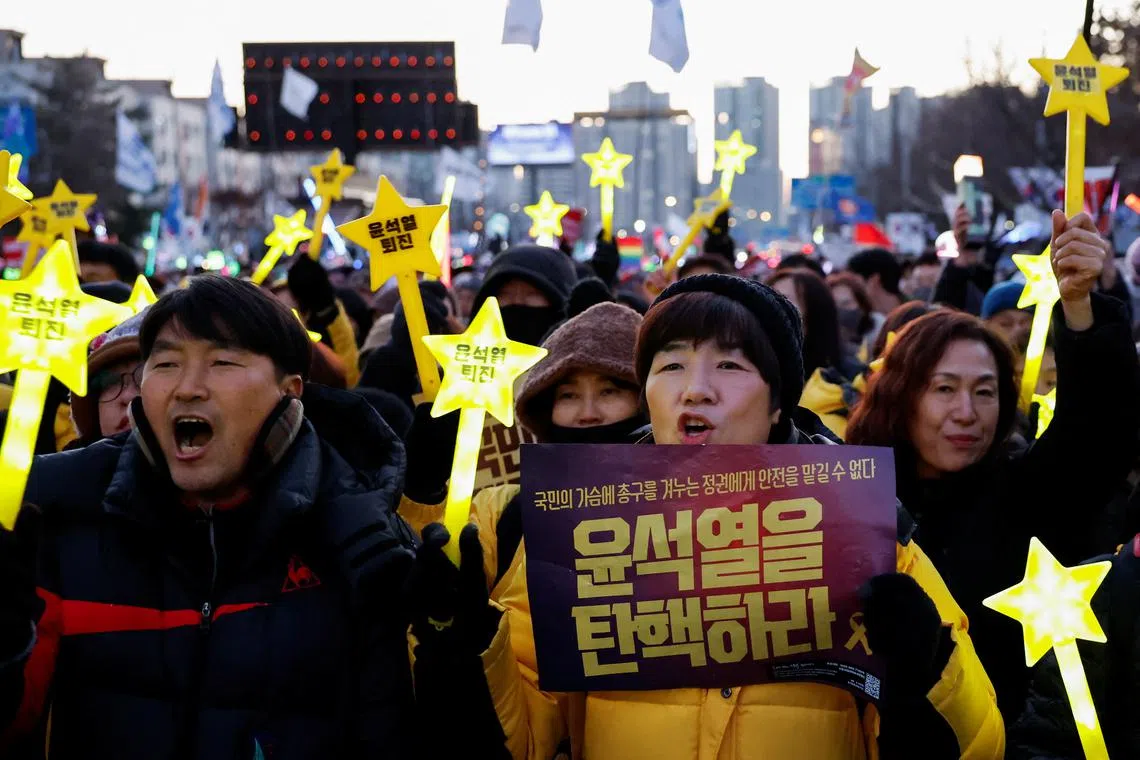President Yoon impeached: South Korea’s 11 days of turmoil
Sign up now: Get ST's newsletters delivered to your inbox

People celebrating after South Korea's Parliament passed a second impeachment motion against President Yoon Suk Yeol.
PHOTO: REUTERS
Follow topic:
SEOUL – South Korean lawmakers on Dec 14 voted to impeach President Yoon Suk Yeol over his short-lived declaration of martial law
Here is a recap of events leading to the crucial vote to suspend him from office:
Dec 3
At 10.23pm, Mr Yoon, following a Budget tussle with the opposition, appears on television and declares martial law.
He says he wants to protect the country from “threats posed by North Korea’s communist forces and to eliminate anti-state elements plundering people’s freedom and happiness”.
Dec 4
12.27 am
As lawmakers rush to Parliament to vote against the measure, heavily armed troops storm the building, scaling fences, smashing windows and landing by helicopter.
At around midnight, soldiers clash with staff and lawmakers who block the main hall with furniture.
News of Mr Yoon’s stunning move sparks protests, drawing thousands to the Parliament.
1.03 am
Lawmakers vote 190-0 to nullify Mr Yoon’s declaration. Soon after, soldiers begin withdrawing.
Protesters chant: “Arrest Yoon Suk Yeol!”
4.29 am
Mr Yoon re-appears on television and says he will lift martial law.
Protesters celebrate. Mr Yoon goes to ground.
2.43 pm
The opposition party vows to push for impeachment and files an official motion.
Opposition lawmakers also quickly file separate complaints of “insurrection” against Mr Yoon, his defence and interior ministers, and “key military and police figures involved, such as the martial law commander and the police chief”.
Dec 5
The head of Mr Yoon’s People Power Party (PPP), Mr Han Dong-hoon, says he will block the impeachment motion.
Only eight of the party’s 108 parliamentarians need to break ranks for it to pass.
Police announce they are investigating Mr Yoon and others for “insurrection”, and lawmakers begin to grill those involved.
Defence Minister Kim Yong-hyun, who resigned the day before, is slapped with a travel ban.
Dec 6
Mr Han warns that South Korea is in “great danger” if Mr Yoon remains in office, implying the president could declare martial law again.
He also says “credible evidence” suggests that Mr Yoon ordered the arrest of key politicians.
Special Forces Commander Kwak Jong-geun says he was ordered to “drag out” lawmakers from Parliament.
Despite Mr Han’s comments, the PPP decides late on the same day that it will still vote against the impeachment when it takes place the next day.
Dec 7
10am
Mr Yoon reappears and in a televised address apologises for the “anxiety and inconvenience”.
But he stops short of resigning.
“I will leave it up to our party to stabilise the political situation in the future, including my term of office,” he says.
He also promises he will not impose martial law for a second time.
4pm
Tens of thousands of anti-Yoon protesters rally outside Parliament.
Police put their numbers at 150,000.
5pm
Voting starts for the impeachment Bill.
Just before the vote, all but a handful of PPP MPs file out.
10pm
After several hours, protesters boo and in some cases weep as the motion is finally declared defeated just before 10pm.
The National Assembly speaker cites the lack of the required two-thirds majority of votes.
Mr Yoon stays in power.
Dec 8
Mr Han says the party has “effectively obtained” Mr Yoon’s promise to step down.
Former defence minister Kim Yong-hyun is arrested over his role in the martial law declaration. The interior minister resigns.
The main opposition party confirms they will try to impeach the president again on Dec 14.
Dec 9
The opposition party accuses the ruling party of staging a “second coup” by clinging to power and refusing to impeach the president.
The justice ministry announces it has slapped a travel ban on Mr Yoon as police probe him.
Dec 10
The former defence minister, already detained, is formally arrested on insurrection charges including “engaging in critical duties during an insurrection” and “abuse of authority to obstruct the exercise of rights”.
Dec 11
North Korean state media comments on the political upheaval for the first time, declaring that South Korea is in “chaos”.
At a parliamentary hearing, the commissioner general of the Korea Correctional Service says the former defence minister tried to kill himself minutes before his arrest was announced.
South Korean police attempt to raid the main building of President Yoon’s offices, but are blocked by security guards.
Dec 12
Mr Yoon again defends his shock decision, saying the opposition pushed the country into a “national crisis”.
He says he will “fight with the people until the very last minute”.
PPP leader Han Dong-hoon changes his stance to support impeachment.
South Korean police raid the headquarters of the military’s capital defence command, which was deployed during the martial law declaration.
Dec 13
Opposition leader Lee Jae-myung urges ruling party lawmakers to side with the “people” and impeach Mr Yoon as the vote looms.
The National Assembly speaker’s office confirms the impeachment vote will start at 4pm (3pm Singapore time) on Dec 14.
Seven ruling party lawmakers pledge to support impeachment – leaving one vote needed for the motion to pass.
Dec 14
Of 300 lawmakers, 204 vote to impeach President Yoon on allegations of insurrection, while 85 vote against the motion. Three abstain, with eight votes nullified.
With the impeachment, Mr Yoon is suspended from office while South Korea’s Constitutional Court deliberates on the vote.
Prime Minister Han Duck-soo is the nation’s interim leader.
The court has 180 days to rule on Mr Yoon’s future. AFP

